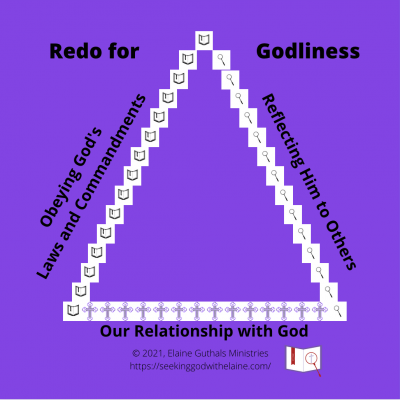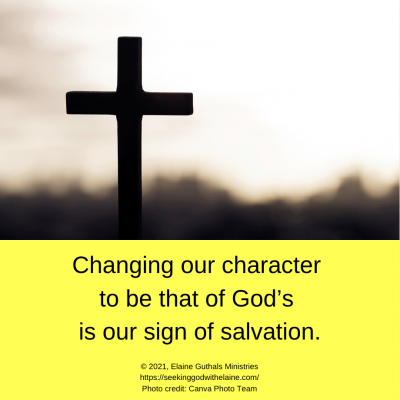
Since I started Seeking God with Elaine, I had been planning on doing a newsletter. Yeah, it’s taken me a while to see what I was going to do.
I don’t want to waste your time, but I want to do something that will help all of us.
Doing the summaries at the end of last year, I got the idea for what we could do. If we do the monthly summaries as we go, maybe the end summaries will be more meaningful.
Since we have three sides to our triangle, that is how we are going to sort our nuggets each month.
Let's Put It into Context
Godliness, equated with the Old Testament term fear of the Lord, is an attitude of reverence that is promoted by walking in His Spirit and obeying God’s laws and commandments and produces a moral likeness of God.
Godliness has a dual form as it should be both an inwardly and outwardly expression. Said another way, reverence should be all-encompassing: inward and outward.
The inward expression of godliness is communion with God. Prayer is a two-way communication with God. Even if we are praying with our mouths, we are praying with our hearts. Our inward expression of godliness also manifests itself in confession, praise, and worship. We have to pursue godliness because of an internal stimulus.
The outward expression implies a love for God’s laws and commandments. It manifests itself in our acts of service for God. Service is an act based on belief in God that comes from a response of worship by acknowledging His power through our submission. This is how the inward expression manifests itself in our lives.
To read a related devotion, click the button below.
Ungodliness is denial of God and refusal of following His laws and commandments, instead living a life engaged in sinfulness.
To read a related devotion, click the button below.
Main Nugget
God is going for a total redo (Diligence Is a Work in Progress).

Our Relationship with God
- If we are banking on being a good person without submitting our lives to God for admission to heaven, we will be in for a huge let down. God only gives eternal life to those who have submitted their lives to Him (The Morality of Being Lovely).
- We have to remember that we cannot earn our way into Heaven. The focus has to be on Him, not our actions (The Morality of Being Lovely).
- Do you get that our character being lovely is tied to our worship of sovereign God? That is why we are to worship regularly, praise him continuously, and live joyfully because of all he is doing for us – even in the rough spots (The Morality of Being Lovely).
- We have to remember that our relationship with God is an inward thing that presents itself outwardly. Don’t read that to mean our actions aren’t important. They are. Sanctification uses our actions to change our character to be like God’s (The Morality of Good Report).
- The outward walk without the inward faith means nothing to God (How Do Morals Improve Our Discipleship?)
- God will use His grace to guide us to where He wants us to be. He will use our Sanctification Roads to grow us to be more like Him (How Do Morals Improve Our Discipleship?)
- It is a two-step process in attesting to the quality of God’s moral code. We need to affirm that God’s law is pure. We need to confess we are far from pure (Improving Our Discipleship through Glorifying God).
- Our entire life should be focused on glorifying God through living morally. The bottom line is our motivation. Are we choosing to follow God or not? (Improving Our Discipleship through Glorifying God).
- We go from a worldview focus of doing good to doing good to expand God’s kingdom (How Do Morals Refine Us?).
- If our morals don’t come through our submission to God, they are just worldly morals, not Christian graces (How Do Morals Improve our Discipleship?).
- Disciples are to honor God’s name by acknowledging His nature (Morality to Honor God).
- If we submit to God, we want to imitate Him. If we imitate His character, we live moral lives. If we live moral lives, God will provide us peace and safety (Peace and Safety Are the Rewards of Morality).
- We’ve got to come to God with a true confession of faith. If we say the doctrines revealed in God’s Word are true, we have to say all sin is wrong, and we want nothing to do with it. Just as we can’t pick and choose what is and isn’t a sin, once we decide to accept the gift of salvation, we can’t pick and choose when we are going to repent (What Do Morality, Grace, and Regeneration Have in Common?)
- We can’t be a regenerated new creation when we are hanging on to old sin (What Do Morality, Grace, and Regeneration Have in Common?)
- Repentance can’t be a single act. There is so much sin in us — and the continued opportunity to sin — that it is going to take a while for us to cut it out of our lives (What Do Morality, Grace, and Regeneration Have in Common?)
- God calls us to salvation by His grace but bestows the full measure of His grace only on His children (What Do Morality, Grace, and Regeneration Have in Common?)
- Jesus taught that it isn’t enough just to believe. We have to show our faith by our good works. We have to put feet to our faith (The Commandment of Morality).
- Disciples must show good moral character in order to show worldview people their faith. It shows the depth and the genuineness of our faith (The Commandment of Morality).
- Another way to look at it is that the it is the test of our faith (The Commandment of Morality).
- While there is no connection between salvation and good works, there is between faith and completing whatever tasks He assigns for us to do (The Commandment of Morality).
Glossary

Obeying God’s Laws and Commandments
- If our temperamental makeup is to reflect God, it should not be a cruel disposition or even a weak one. We should reflect His love and concern for the spiritual condition of others (The Morality of Being Lovely).
- God wants us to live our lives obeying Him and following His lead (The Morality of Being Lovely).
- We are to conduct ourselves honorably. We are to be in the world. We are to have contact with non-believers. We are to be consistent in our behavior. What Peter is really getting at here is that we have to remain pure in heart regardless of our location and company at the time (The Morality of Good Report).
- The progress is to be applied over all of our nature. God isn’t interested in fixing only one or two aspects of our character (Diligence Is a Work in Progress).
- Sometimes, we may not fully understand what “… forgetting what is behind …” entails (Phil. 3: 1 CSB). Oh, we understand we are to forget and quit the past sins — which may mean changing our circle of friends. We have to forget the past good works. When we performed that good work, we were not doing it to glorify God. Our goal was not to expand His kingdom. Our goal was probably tied up with trying to make something better in this world. It has nothing to do with our spiritual condition (Diligently Forgetting Sin and Focusing on Godliness).
- For Paul, he boiled it down to one thing: he was aiming for perfection, knowing he wouldn’t achieve it here. What Paul was aiming for was the mark, not the prize. We are not supposed to be aiming for blessedness or perfection. We are to aim for what gets us there — changing our character to be like God’s. Our attainment of God’s character is also the prize. We aren’t going to be totally successful in the change until we get to Heaven (Diligently Forgetting Sin and Focusing on Godliness).
- The aim or prize is all about what our character is and Who it looks like. Gaining Heaven is secondary. Being with and like God is primary (Diligently Forgetting Sin and Focusing on Godliness).
- We tend to think of perfection as doing all the do’s and not doing all the don’ts. That isn’t going to happen — even after we become disciples. Perfection is about being. It is about obtaining the character of God. No, that doesn’t give us license to go out and sin. It gives us the assurance that God will continue to forgive us when we ask as we work through our salvation on the Sanctification Road (Diligently Forgetting Sin and Focusing on Godliness).
- There are so many times in life where we beg God for a redo. We messed up, and we want a second, third, fourth chance with God. God gives us that chance. Every single moment of our lives can be a redo. We are given the opportunity. We just have to grab it and do it right (Diligently Forgetting Sin and Focusing on Godliness).
- God isn’t just going to give us perfection without us ABCDing and redoing our character (Diligently Forgetting Sin and Focusing on Godliness).
- We kick ourselves for not having God’s character. But we never give ourselves credit for being dissatisfied with who we are (Diligently Forgetting Sin and Focusing on Godliness).
- We should never be satisfied. Our growing process must be a life-long process. We never arrive while here on earth. We shouldn’t become complacent with where we are on the Sanctification Road. We can also do better at imitating God (Diligently Forgetting Sin and Focusing on Godliness).
- We think of God revealing His grace on the cross. We even go back further than that. We think of God’s infinite grace through which He devised the Plan of Salvation that made Jesus our Redeemer in order to forgive us of our sins. Occasionally, we might even acknowledge the grace God shows us as we are navigating the Sanctification Road. We need that gift to keep forgiving us as we still break God’s laws and commandments as we learn to be like Him. But how many times does it sink in that God isn’t done giving us his grace yet? There is still grace to come. God will really show us His grace when Jesus comes back (The Morality of Being Hopeful).
- Faith includes a self-reflection piece so we can decide what we truly believe. Hope takes that look outside of us and focuses on what God will do for us (The Morality of Being Hopeful).
- We don’t get to choose the goodness and pass on the righteousness part. If we do, we are passing on the God part (How Do Morals Improve Our Discipleship?)
- Morality is a system of conduct where we determine right from wrong. Isn’t that what the Sanctification Road is teaching us — right from wrong? Good from evil? (How Do Morals Improve Our Discipleship?)
- We glorify God by the good works performed through His righteousness in us. Our being and doing should be to glorify God (Improving Our Discipleship through Glorifying God).
- Our faith has to be whole. Everything we believe and do — from the largest thing to the smallest — must be governed by our faith (Honoring God with Our Lives).
- We can’t be begrudgingly obedient to God and think we are honoring Him. We have to be completely submitted to Him to cheerfully do His Will (Honoring God with Our Lives).
- We do have much to add to the narrative of the gospel. No, we are not changing the gospel. We are adding to the reports of how that plays out in our lives today (Honoring God with Our Lives).
- Inner beauty is tied up with our spiritual graces/enhanced morals. Those are leading us to be godly — holy and righteous. This inner beauty is much more important to God than outward beauty (Honoring God with Our Lives).
- Moral superiority is more powerful than physical superiority (Peace and Safety Are the Rewards of Morality).
- We have to put ourselves into position to hear God’s Word. We have to work at it so we can understand who God is and what He has done for us. We have to live the way He wants us to live. We have to live moral lives (Peace and Safety Are the Rewards of Morality).
- If we think that the moral laws are the least of His commandments, we have to realize God does not (The Commandment of Morality).
- The greatest commandments have no more authority than the least commandments. The least commandments offend God just as much as the greatest commandments (The Commandment of Morality).
- God is less interested in what we do than who we are. We can’t earn our way to salvation. It is based on changing ourselves to be more like him — changing who we are (The Commandment of Morality).
Glossary

Reflecting Him to Others
- Our inner character is shown through the decisions we make. Possibly one of the best ways to show that is in how we treat others. How we treat others either makes the situation peaceful or causes strife (The Morality of Being Lovely).
- Paul talked about becoming all things to all men (I Cor. 19-23). We do need to do that to a point. However, we cannot change our beliefs — and commit sins — to fit in with others (The Morality of Good Report).
- God calls us to live our lives as a witness — and to use our words to tell about Him. But He doesn’t take away our free will (The Morality of Good Report).
- We have to make daily choices to follow God. Unfortunately, sometimes we make the wrong choices. God will forgive us when we ask (The Morality of Good Report).
- What helps us believe in God? It isn’t a case of seeing is believing in the usual sense of the word. Instead, we have to see with the eyes of our hearts. A person who is attached to the worldview would have a hard time embracing the Godview. Faith calls us to turn away from worldview standards and submit to God’s laws and commandments. In order to believe, we have to have some knowledge. No, we won’t understand it all. If we did, it wouldn’t be faith driving our acceptance of God (The Morality of Diligence).
- Our conversion is the only evidence that God wants a relationship with us. Well, think about it. We have to do a 180 degree change — in our allegiance if not in our actions. That is a big change. On top of that, we do nothing to foster the change — except seek God. Only God has the power to cause the change (Diligence Is a Work in Progress).
- The challenge we face is that these changes are not always visible. Worse than that, they have been likened to the tide — they come and go. This retrograde movement — when we do see it — is why worldview people think disciples are hypocrites (Diligence Is a Work in Progress).
- God wants us to use our conversation to tell others about Him, promote unity, and knit the family together (Diligently Forgetting Sin and Focusing on Godliness).
- Unlike the worldly hope, disciples can truly believe that the object of our hope is permanent. It will last throughout eternity (The Morality of Being Hopeful).
- God does expect our relationships with Him to be visible to others. They have to be able to see what we believe. But that stems from the inside and touches on the how aspect (How Do Morals Improve Our Discipleship?)
- For I was hungry for the Word of God and you introduced me to it and helped me understand.
- I was thirsty, and you took me to the well of Living Water and gave me drink.
- I was a stranger searching for God, and you welcomed me and guided me to find Him.
- I was naked, and you clothed me. “I rejoice greatly in the LORD, I exult in my God; for he has clothed me with the garments of salvation and wrapped me in a robe of righteousness …” (Isa. 61: 10 CSB).
- I was sick because sin is an illness, and you visited me with the cure.
- I was in prison because all sinners are prisoners to sin, and you came to tell me how to break out (Improving Our Discipleship through Right and Wrong).
- God’s priority is our spiritual condition, not our physical condition. He wants us to witness to others to expand His kingdom (Improving Our Discipleship through Right and Wrong).
- We have to approach worldview people with love but realistically. We can’t approach them in ways that accentuates the divide, but we cannot tolerate sin (Improving Our Discipleship through Right and Wrong).
- Worldview people just see the ceremony of religion rather than the relationship for which God is actually striving. They see morality as a man-to-man exercise, not as man-to-God (Improving Our Discipleship through Glorifying God).
- Our refusing to make the right choices can lead others to believe God is weak (Morality to Honor God).
- We are to be ambassadors for the gospel by showing others to see their needs for it (Honoring God with Our Lives).
- We are known as children of God by our good works. We have to be showing God’s character in our performance. That means our morals have to be at the forefront (The Commandment of Morality).

To read devotions in the Redo for Godliness series, click the appropriate button below.